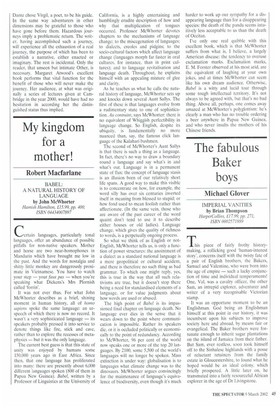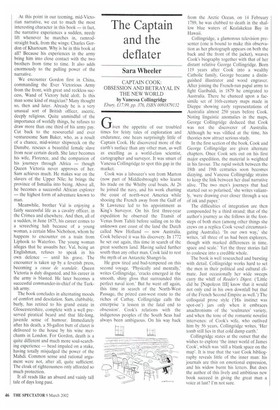The fabulous Baker boys
Michael Glover
IMPERIAL VANITIES by Brian Thompson HarperCollins, £17.99. pp. 271, ISBN 0002571889 his piece of fairly frothy historymaking, a rollicking good 'human-interest story', concerns itself with the twisty fate of a pair of English brothers, the Bakers, Samuel and Valentine, who were born into the age of empire — such a lucky conjunction of time and individual temperaments! One, Val, was a cavalry officer, the other Sam, an intrepid explorer, adventurer and writer of a very recognisable Victorian stamp.
It was an opportune moment to be an Englishman. God being an Englishman himself at this point in our history, it was incumbent upon his subjects to improve society here and abroad, by means fair or evangelical. The Baker brothers were fortunate enough to inherit sugar plantations on the island of Jamaica from their father. But Sam, ever restless, soon took himself off to the Sinhalese highlands with a posse of reluctant retainers from the family estate in Gloucestershire, to found what he hoped would be an ideal colony, which briefly prospered. A little later on, he transmuted into a fairly resourceful African explorer in the age of Dr Livingstone. At this point in our teeming, mid-Victorian narrative, we cut to much the most interesting character in this book — in fact, the narrative experiences a sudden, needy lift whenever he marches in, ramrodstraight back, from the wings: Charles Gordon of Khartoum. Why is he in this book at all? Because his experiences in the army bring him into close contact with the two brothers from time to time. It also adds enormously to the pulling power of the narrative.
We encounter Gordon first in China, commanding the Ever Victorious Army from the front, with great and reckless success, Wand of Victory held aloft. Is this man some kind of magician? Many thought so, then and later. Already he is a very unusual sort of British officer, ascetic, deeply religious. Quite unmindful of the importance of worldly things, he refuses to draw more than one third of his army pay. Cut back to the resourceful and ever venturesome Sam Baker, who, as a result of a chance, mid-winter shipwreck on the Danube, rescues a beautiful female slave from near certain death. She later becomes his wife, Florence, and the companion of his journeys through Africa — though Queen Victoria never approves of her. Sam achieves much. He makes war on the slavers of the Upper Nile; he brings the province of Ismailia into being. Above all, he becomes a successful African explorer — the highest form of adventure known to man.
Meanwhile, brother Val is enjoying a fairly successful life as a cavalry officer, in the Crimea and elsewhere. And then, all of a sudden, in June 1875, his career comes to a screeching halt because of a young woman, a certain Miss Nicholson, whom he happens to encounter on a train from Liphook to Waterloo. The young woman alleges that he assaults her. Val, being an Englishman, refuses to speak in his own defence — until his grave. The encounter is taken up by a feverish press, becoming a cause de scandale. Queen Victoria is duly disgusted, and his career in the army is blasted, He later becomes a successful commander-in-chief of the Turkish army.
The book concludes in alternating moods of comfort and desolation. Sam, clubbable, burly, has retired to his grand estate in Gloucestershire, complete with a well preserved piratical beard and that life-long, juvenile sense of humour. Immediately after his death, a 50-gallon butt of claret is delivered to the house by his wine merchants in London. For Gordon, death is a quite different and much more soul-searching experience — head impaled on a stake, having totally misjudged the power of the Mahdi. Common sense and rational argument were not, after all, quite sufficient. The cloak of righteousness only afforded so much protection.
It all reads like an absurd and vainly tall tale of days long past.















































































 Previous page
Previous page